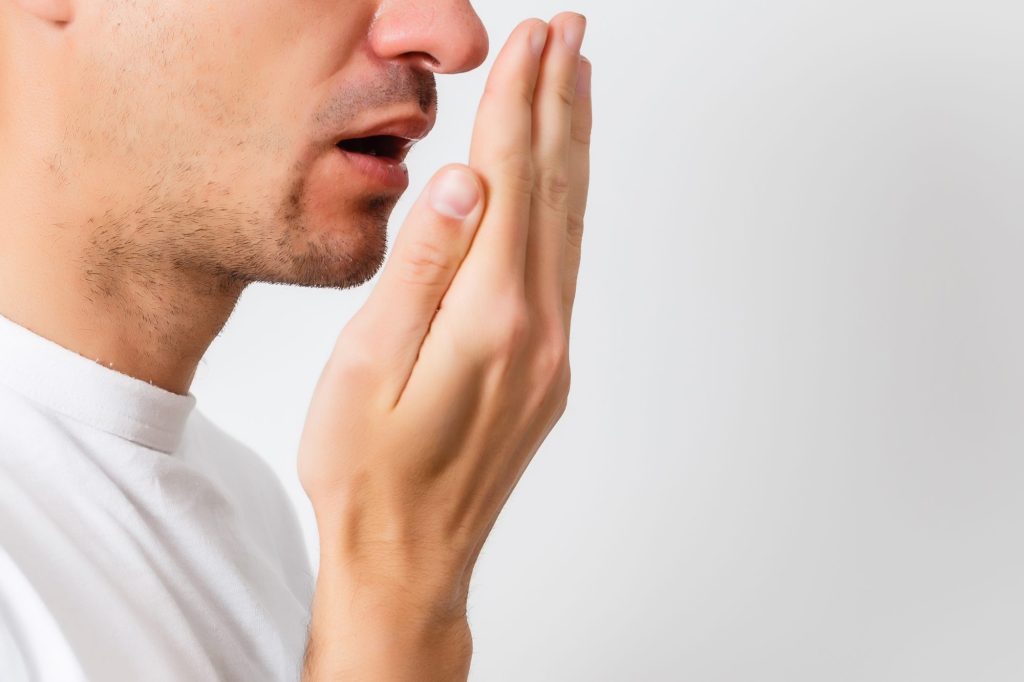A focus on keeping your smile looking its best often helps you maintain good oral health as well. Yet, at times, you may discover you are experiencing bad breath that lingers or comes and goes. Not only is this potentially embarrassing, but it may also indicate a developing problem that you’ll need to address sooner rather than later.
Fortunately, there are easy ways you can maintain healthy teeth and gums and also improve your breath. By knowing what the potential causes are for your bad breath and understanding how to better care for your oral health, you can rid yourself of bad breath and remain confident when you’re around other people.
12 Ways to Get Rid of Bad Breath
There are several potential ways to get rid of bad breath, but much will depend on your circumstances, current oral health, and dental hygiene habits. Take a good look at your current routine when it comes to taking care of your teeth and gums. You may also need to incorporate some of the following steps to help.
1. Brush after Each Meal
While you may already brush twice a day as recommended, take it one step further and brush your teeth after each meal. You may also want to brush after snacking. Make it as convenient as possible so you won’t skip this step. Keep a toothbrush and toothpaste nearby, such as in your purse or desk drawer at work.
Ask your dentist if a toothpaste containing antibacterial agents will help as these can often reduce the odors of bad breath. Also, switch out your toothbrush often, such as every three months or so.
2. Floss One or More Times Per Day
Flossing after meals to remove leftover food debris and accumulating bacteria from inside your mouth can help prevent or reduce bad breath. Make time to floss properly, and always keep floss on hand so you won’t have to wait until later.
3. Drink and Rinse with Water
If you find yourself out after a meal and with no toothbrush available, swish water around inside your mouth to dislodge food particles. Also, carry water with you everywhere and sip on it throughout the day to help keep your mouth clear of leftover food debris that can serve as a meal for bacteria.
4. Use Mouth Rinses
Bad breath may result from plaque and bacteria build-up on your teeth, so consider using a mouth rinse that is specifically formulated to kill bacteria. Find one that kills the germs causing bad breath and not one that just makes your mouth feel fresh and clean. If you’re unsure what to use, ask your dentist for a recommendation.
5. Focus on Cleaning Your Tongue
Bacteria tend to linger on the back of your tongue, so take a few extra seconds to brush there and reduce potential odors from developing. For a reminder, try using a toothbrush that is designed with an additional tongue cleaner feature.
Some people experience excessive bacteria growth, referred to as coated tongue, and this is usually due to such factors as dry mouth or smoking. To rid yourself of this, try using a specially designed tongue scraper.
6. Avoid Long Bouts of Dry Mouth
Dry mouth can be problematic because it results in less amounts of saliva inside the mouth. Saliva is the oral cavity’s natural defense mechanism, moving acids caused by plaque out of the mouth and preventing tooth decay and resulting bad breath.
Keep your mouth moist by carrying a water bottle with you and sipping on it throughout the day. If your mouth still feels dry, consider chewing sugarless gum to stimulate saliva flow.
Another way to avoid long bouts of dry mouth is to stay away from tobacco, coffee, tea, alcohol, and soft drinks.
Chronic dry mouth can occur for a number of reasons, including a health condition or even prescription medication. Talk with your dentist about your dry mouth and see if specialty medications can increase the saliva flow and help you stave off bad breath.
7. Learn Better Ways to Clean Dental Appliances and Dentures
For those who wear dentures (partial or full), knowing how to adequately care for them is crucial. Follow your dentist’s recommendations for cleaning them at least once per day.
The wearing of mouthguards or dental retainers is another place to focus your attention when it comes to ridding bad breath. Clean these whenever you take them out and before storing them. Clean or rinse them again before placing back inside your mouth.
8. Plan Your Diet
Bad breath can be caused by the foods you consume, including garlic or onions. Limit these as much as possible. Also, high-sugar foods and beverages can increase the level of starches and bacteria in the mouth and result in not only cavities but also bad breath.
9. Avoid Tobacco or Quit Smoking
Tobacco usage can cause staining of teeth, damage to your gums, and result in chronic bad breath. Avoid smoking, vaping, or chewing tobacco. If you already do these things, find a way that will work for you to help you quit.
10. Schedule Regular Dentist Appointments
Schedule regular dental cleanings as these allow your hygienist to provide a deep cleaning and see where any problems may be developing. Dental exams will also help find issues before they turn into more serious problems.
Your bad breath can also result from an underlying health condition. Your dentist will ask you questions to determine if one of these is the cause and recommend the next steps to take, including seeing a specialist.
11. Treat Your Gum Disease
Periodontal disease (gum disease) causes your gums to pull away from the base of teeth, leaving pockets that begin to fill with that odor-causing bacteria. You may need to undergo a professional cleaning of those pockets not only to treat the disease but to help get rid of your bad breath.
12. Replace Failing Tooth Restorations
When tooth restorations, such as crowns, begin to fail, they become a bacteria breeding ground. Your dentist may recommend replacing these restorations to help protect you from that build-up and eliminate your bad breath.
Contact South Dayton Smiles Today to Schedule an Appointment
If you are currently experiencing bad breath or any other dental issue, contact our compassionate team here at South Dayton Smiles. We can provide you or your family member with a thorough dental exam to determine the causes and then offer solutions to help you alleviate that bad breath. Contact us today and schedule your appointment for whatever your dental needs may be.

 Meet Dr. Botti
Meet Dr. Botti
 Meet Dr. Scranton
Meet Dr. Scranton
 Our Team
Our Team
 Patient Forms
Patient Forms Online Bill Pay
Online Bill Pay Benefit Program
Benefit Program Your First Visit
Your First Visit